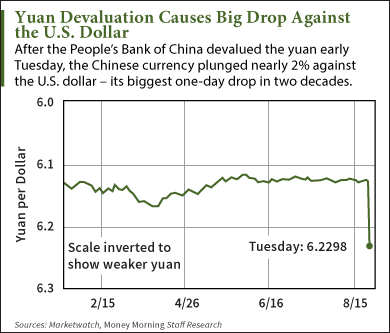The Chinese central bank would never admit it, but China's stock market crash surely weighed on its decision today to devalue the yuan.
 The news had an immediate impact, with the yuan falling nearly 2% against the U.S. dollar. It marked the biggest one-day plunge since 1994.
The news had an immediate impact, with the yuan falling nearly 2% against the U.S. dollar. It marked the biggest one-day plunge since 1994.
Because of the way the yuan is controlled by the People's Bank of China (PBOC), the devaluation of the yuan wasn't achieved by lowering interest rates - the way most central banks would do it.
You see, the PBOC had confined the yuan's value to a 2% range above or below the U.S. dollar, called the "daily fixing." Now the PBOC will let the yuan trade a bit more freely, basing the yuan's value on its close from the previous trading session.
The PBOC said the reason was to make the yuan's value more market-based. That's something that the International Monetary Fund (IMF) has urged as China seeks to get the yuan elevated to the status of a world reserve currency.
But the timing of the move suggests that China's stock market crash also has played a role. A combination of weakness in the Chinese economy and risky investing practices, particularly margin trading, lopped as much as 32% from the Shanghai Composite Index from June to July, and it's still down 24% from the high.
Concerns about the health of the Chinese economy - and the markets - rose when the government reported over the weekend that the nation's July exports plunged 8.3% from the previous year. The Chinese government also reported that inflation rose only 1.6% in July - about half of the government target of 3%.
The lousy economic data drove the PBOC to reverse its resistance to loosening its grip on the yuan, something the IMF, other central banks, and the U.S government have urged for years.
The Yuan Devaluation a Tool to Stem China's Stock Market Crash
"I've long warned that Washington should be careful what it wished for," said Money Morning Chef Investment Strategist Keith Fitz-Gerald. "This is HUGE because it means China's entered the currency wars in the biggest devaluation of the last 20 years. It's a move intended to shore up exporters."
[epom key="ddec3ef33420ef7c9964a4695c349764" redirect="" sourceid="" imported="false"]
Exports are a big part of the Chinese economy. So the PBOC is just following the lead of other central banks (including the U.S. Federal Reserve) in devaluing its currency in a bid to stimulate its economy.
Indeed, the Chinese government has tried just about everything to prop up its sagging stock market, from pumping money into the market to freezing trading on as many as half of Chinese companies.
Despite the frantic efforts of the Chinese government, the Shanghai index is still down 24% from its June 12 high. So now the PBOC is trying a devaluation of the yuan.
But other nations might not sit still for a cheaper yuan, as it puts them at a trade disadvantage. If ongoing woes in the Chinese economy drive the PBOC to take further action to devalue the yuan, it will only accelerate the currency wars.
"It's hard to believe this will be a one-off adjustment," Stephen Roach, a senior fellow at Yale University and former non-executive chairman for Morgan Stanley in Asia, told Bloomberg. "In a weak global economy, it will take a lot more than a 1.9% devaluation to jump-start sagging Chinese exports. That raises the distinct possibility of a new and increasingly destabilizing skirmish in the ever-widening global currency war. The race to the bottom just became a good deal more treacherous."
China Targets the Gold Market: The Chinese government has a multi-pronged strategy to strengthen the Asian giant's economy. After years of playing second fiddle in the gold market to the Western economic powers in Europe and the United States, China is making moves toward a more influential role. Here's how China plans to dominate the world gold market...
Follow me on Twitter @DavidGZeiler.
Related Articles:
- Bloomberg: China Rattles Markets with Yuan Devaluation
About the Author
David Zeiler, Associate Editor for Money Morning at Money Map Press, has been a journalist for more than 35 years, including 18 spent at The Baltimore Sun. He has worked as a writer, editor, and page designer at different times in his career. He's interviewed a number of well-known personalities - ranging from punk rock icon Joey Ramone to Apple Inc. co-founder Steve Wozniak.
Over the course of his journalistic career, Dave has covered many diverse subjects. Since arriving at Money Morning in 2011, he has focused primarily on technology. He's an expert on both Apple and cryptocurrencies. He started writing about Apple for The Sun in the mid-1990s, and had an Apple blog on The Sun's web site from 2007-2009. Dave's been writing about Bitcoin since 2011 - long before most people had even heard of it. He even mined it for a short time.
Dave has a BA in English and Mass Communications from Loyola University Maryland.



